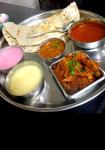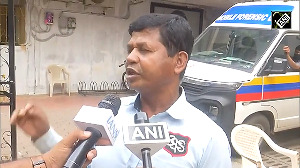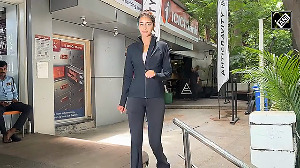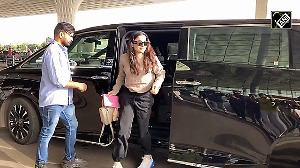The latest fan of Gujarat Chief Minister Narendra Modi seems to be the American Samoan delegate, Eni Faleomavaega, the ranking Democrat on the house foreign affairs subcommittee on Asia and the Pacific, which has jurisdiction over matters pertaining to South Asia. Aziz Haniffa reports.
During the subcommittee’s first hearing Tuesday in the 113th Congress, before which the Obama administration’s point man for South Asia, Robert Blake was testifying, Faleomavaega in his opening remarks made an earnest plea for the administration to begin a dialogue with Modi.
“I also want to suggest that it is time for our government to begin a dialogue with Modi -- the chief minister, Modi, who may well be the the next prime minister for India,” the lawmaker said.
Faleomavaega added, “The United States-India relationship is significant, as you have commented in your statement, Mr Chairman. It is one of the defining partnerships of the 21st century. And Modi is a leading figure in that process.”
“Modi's philosophy of bringing development to the doorstep of every poor person, every farmer, every worker, is one that transcends caste, culture, regional and religious differences and has led to a decade of unprecedented growth and development in the province of the state of Gujarat, a key state which has contributed considerably to India's economy and development,” he said.
Faleomavaega pointed out that ‘companies such as Ford and General Motors are setting up factories in Gujarat, and in a move that promises to strengthen US-India relations now and in the years to come.”
But during the interaction that followed with Blake, perhaps thankfully for Blake, neither Faleomavaega nor any other member of the Subcommittee, brought up this issue again.
The last time the Modi visa issue cropped up was in November following the British embrace of Modi -- with the British high commissioner in New Delhi visiting with the chief minister -- although even at that time, no application had been made on his behalf at any US consulate in India.
At the time, senior administration officials told rediff.com that they believed it’s inevitable that such a request for a US visa for Modi to is likely to be made soon, considering the massive lobbying by certain quarters of the Indian American community through various US lawmakers.
This has which has led to an equally vociferous human rights coalition of civil rights organisations and Indian and American Muslim groups serving notice on the administration that they would strongly oppose any issuance of a US visa to Modi, whom they hold culpable for the pogroms of Muslims in Gujarat in 2002.
The officials at the time acknowledged that it was sensitive to the reality of the number of US businesses and corporation now make a beeline for Gujarat in the wake of its pro-growth, pro-investment policies vis-à-vis foreign direct investment,
In November, it was acknowledged as much by the senior-most career diplomat, Deputy Secretary of State, William Burns.
During an appearance at the Center for American Progress, following his return from India, Burns after delivering a keynote address and during the interaction that followed was asked by John Sifton, advocacy director of the Human Rights Watch, the leading US human rights organisation that following Britain’s embrace of Modi, whether the US would follow suit and issue him a visa to visit this country.
Sifton said, “About 10 years ago. There was major violence in Gujarat and we were there on the ground at the time and documented 2,500 deaths. The British government has just decided that it will now end the -- for lack of a better word -- the cold-shoulder policy with Narendra Modi.”
“Is it still US policy, and will it remain US policy for the time being, to maintain it’s cold-shoulder policy with respect to Mr. Modi?" he said.
Burns, in response said that any visa application by Modi would be handled as per the country’s immigration laws, but noted the burgeoning US business interests in Gujarat and said the administration was fully supportive of this.
“The question has often arisen about, Modi's potential application for visas, for example, to come to the US,” he said, “and you know, the truth is I can't comment on individual visa applications. You know, those get handled, according to US immigration law at the time there's an application,” he added.
But Burns pointed out, "With regard to Gujarat in general, you know, obviously, to, you know, come back to the question about business activity, a lot of American businesses have interests there. We continue to support that.”
“Obviously, there are a lot of Indian-Americans who come from Gujarat too. So there's a strong connection. But I don't have anything new to suggest with regard to personalities," he added.
In March 2005, Modi was denied a visa for his alleged complicity in Gujarat’s sectarian violence in 2002. He had applied for a visa to attend the Asian American Hotel Owners Association annual convention where he was to deliver the keynote address.
Interestingly, the refusal of the visa at the time to Modi came just two days after the visit to New Delhi of then US Secretary of State Condoleezza Rice and although the Congress Party-led United Progressive Alliance government had no love lost for Modi, it summoned the then US deputy chief of mission at the American embassy in Delhi, who at the time was Blake, and lodged a strong protest over Washington’s decision called it ‘uncalled for’.
The external affairs ministry at the time said, “The action on the part of the US embassy is uncalled for and displays lack of courtesy and sensitivity towards a constitutionally elected chief minister of a state of India."
The US embassy at the time said Modi’s tourist and business visa issued in 1998, had been revoked and there was no chance he would be issued a diplomatic visa either.
Earlier, the US embassy said Modi's tourist and business visa, issued in 1998, had been revoked and he would not get a diplomatic visa either.
At the time, an angry Modi called the US decision ‘an insult to the Indian constitution and an attack on Indian sovereignty’.
But the US held firm and did not issue him a visa, saying the decision had been taken under the provisions of the Immigration and Nationality Act, ‘under which any foreign government official responsible for serious violation of religious freedom is ineligible for a visa.”
The state department said that “the US law is clear that states or government officials responsible for carrying out serious violations of religious freedom are ineligible for a visa.”
In May last year, the US Consulate in New Delhi informed US Senator Bob Corker, Tennessee Republican and a member of the powerful senate foreign relations committee that Modi is not eligible to receive a diplomatic visa.
On the urging of his Indian American constituents, led by activist Tarun Surti of Nashville, Tennessee -- one of Modi’s staunchest supporters in the US -- and several senior members of the Asian American Hotel Owners Association, the majority of whom have origins in Gujarat and are ardent fans of Modi, Corker had contacted the US Consulate in New Delhi to explore the possibility of Modi being granted a diplomatic visa to visit the US.
But Surti said, he had received a call from Corker’s office ‘notifying me that the ‘Diplomatic Visa’ is not available to Sri Narendrabhai Modi’.
He said, “The US consulate in Delhi informed Senator's office that such visa are reserved for federal government employees only and not available to State Government officials.”
Surti, said that Corker’s office had also been notified by “The US Consulate in Delhi that it is unwilling to address the illegal revocation of Sri Narendrabhai's visa and now wants him to reapply for visa.”
“He will be insulted third time assuming that the US consulate in Delhi again rejects his visa application,” Surti complained, and added, “Narendrabhai has been insulted twice before and does not need another insult.”
At the time, an aide to Corker, confirmed to rediff.com that the Senator had been informed that Modi is not eligible for a diplomatic visa and that if he applies for a visitor’s visa ‘it will be considered on its merits’, but that there ‘is no guarantee that he will be issued one’.








